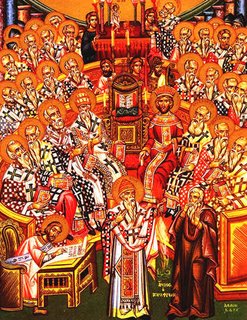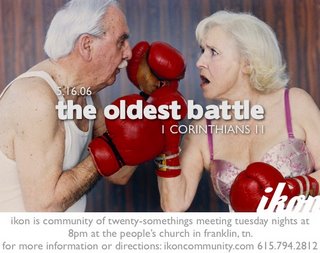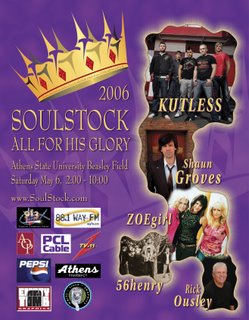I've steered clear of making any recommendations about what to do or not do, what to think or not think, how to respond or not respond to The Da Vinci Code...at least here on this blog. Instead, I've done my best to expose us to various view points within Christianity in America concerning the popular book that has now become a film with an imminent release date. My goal was to both start disagreements and then dialogue and then resolution of some kind. Lofty I know, arrogant even, manipulative perhaps - but it's my blog so I can toy with you if I want to...as long as no harm is done.
And no harm has been done. I've learned a lot from everyone who's participated in the discussion here and I've second guessed, third guessed and, well, you get the picture, my ideas about all this. Here's what I'm thinking now about all this - not that you're asking - followed by a recommendation, which you're also not asking for. So stop reading if getting either will be irritating to you.
NOT JUST FICTION:
Some have said, "It's just fiction. Why is anyone upset about this book/film? Why take it seriously at all? That's like thinking Left Behind books are factual!"
That's exactly what I thought until discussion broke out here and my inbox got hit with a few questions from Christians who obviously have been caused to doubt their faith and buy into what I thought were obvious lies in Dan Brown's excellent tale. Coupled with this evidence of the book's impact on some Christians I love, most of them strangers, was the smoking gun of Dan Brown's own words I discovered a couple days ago - again, forwarded to me by a SHLOG.COM reader:
From Good Morning America interview, November 3, 2003 (ABC News Transcripts)
CHARLES GIBSON: "...This is a novel. If you were writing it as a non-fiction book.... how would it have been different?"
DAN BROWN: "I don't think it would have. I began the research for 'The Da Vinci Code' as a skeptic. I entirely expected, as I researched the book, to disprove this theory. And after numerous trips to Europe, about two years of research, I really became a believer. And it’s important to remember that this is a novel about a theory that has been out there for a long time."
So I personally know now, and I didn't before we started talking here about all this, of people who are believing this fictional book to be historically factual enough to end their belief in Jesus as the divine Christ. AND it seems from Dan Brown's own words that he too believes his fiction to be based on factual evidence that the divine Christ is a myth. Therefore, I cannot dismiss this book as harmless fiction. Harmless to me, perhaps. To most, perhaps. But not harmless to all.
THE RESPONSE:
So what to do about this? Depends on who you are I suppose. I certainly won't make any suggestions about what YOU should do or not do, say or not say, in response to this book/film. (Though I will make a suggestion in a minute about the spirit and limits of any response you make.) I have had to come to grips though, as much as I hate this reality for some odd reason, that it is a pastor's job, duty, obligation laid out for him/her in scripture to protect the people entrusted to him/her from false doctrine. It's strange at the very least that a work of fiction is being defended against and being debunked, and I wish it weren't so, but as I've already said, when Mr.Brown put his pen to paper with the intent of spreading what he believed to be facts regarding the non-divinty of Jesus he became a weapon forged against the Church. A mean spirited weapon? Don't think so. An effective weapon? Not largely. But a weapon none the less.
The Church will never die. Nor will God's image ever be soiled beyond recognition. But while the Church and God won't die if I do nothing, somehow, and I don't fully understand why this is, God has made it clear that it is my job as a pastor, teaching and protecting those who accept me as their pastor, to be informed and make time to answer any questions that come my way about this book/film. It's a vocational/occupational inconvenience and honor to now be given the responsibility to enter into conversation about the ideas in this book and defend orthodox Christianity against any lies when they are misconstrued as fact - WHEN those lies are concerning the core of our belief system.
And it's my job to listen as much or more than I talk in this conversation, to admit where the Church has failed, to humbly admit when I just don't know the answers but to also confidently give the facts as I know them kindly and without apology.
I don't, as of today, think it's my job to hold a press conference to tell those outside my faith that Dan Brown is a liar. It's not my job to assault his character or mock him. It's not my job to belittle anyone for believing this book's theories. It's not my job to stage boycotts and the like. My job, and I think your job as a Christian as well, it appropriately and ironically to be like the early Church questioned by Mr. Brown's novel. The early Church, amid martyrdom, unemployment, harassment and the twisting and adoption of their beliefs by pagan religions, kept being the Church: meeting together, praying fervently, reminding each other of what was true, meeting one another's needs, being the proof of a doubted God by putting skin on His love and mercy and peace in their community. They did not go public with their arguments against heresy, did not attack non-Christians for their odd theories and religions, did not expect fair treatment and truth from their society and whine when they did not receive it. Instead Church leaders wrote letters and preached sermons and crafted icons that reminded believers of what was true while living out what was true themselves. Then they sat back and allowed the chips to fall where they may.
And we're still here. And we'll still be here after The Da Vinci Code posts record first week box office numbers...and it will.
Like I said, I don't know what your response should be to this book/film but mine is to remind people who look to me for answers of what I know is true and to back that up with my life. Whatever your response is to be I do know it should represent the love of God accurately while making obvious your confidence in the divinity of Christ with a life of obedience.
THE RECOMMENDATION:
There are many books out suddenly "debunking" The Da Vinci Code. Honestly, I think much of it is poorly written and over kill. One need not prove that there are more windows in the Louvre than Dan Brown claims to rectify the IMPORTANT errors in his account of historical Christianity. Those important errors, in my opinion, would concern matters like: How was the bible we have today assembled? What was Constantine's role in that process? What changes did COnstantine and others make to Christianity and scripture? Did Jesus claim to be divine? Why are "new" books such as the Gospel of Thomas and The Gospel of Judas not credible to modern day Christians?
Answering these questions alone, using historical evidence and prevailing wisdom among non-Christian archaeologists and scholars pokes enough holes in Dan Brown's theories for them to sink on their own. One source I'd recommend for researching answers to these questions is
Truth and Fiction in The Da Vinci Code : A Historian Reveals What We Really Know about Jesus, Mary Magdalene, and Constantine by admitted agnostic Bart D. Ehrman, chair of religious studies at UNC Chapel Hill, NC. It is a book without a theological or denominational agenda of any kind - seemingly. It focusses on finding answers to the questions I've listed here as seemingly most important and foundational to Brown's theories and the Christian faith.
So there. I gave an opinion of sorts. Hope we're still friends. See the movie or don't - I don't know what you should do. But I know this book/movie, while it is fiction, is somehow affecting some Christians profoundly and was written to do so and therefore cannot be ignored but must be responded to, at the very least, by church leaders being asked great questions by intelligent people in their churches.
































